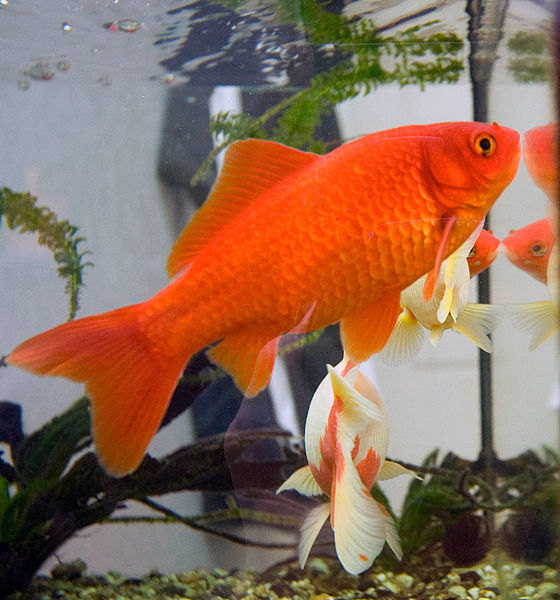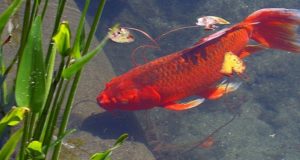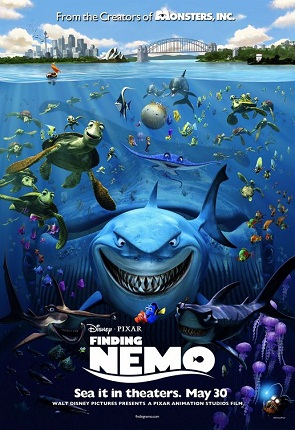 One of my first ever experiences with fishkeeping was with a goldfish won at a carnival – I thought it looked hungry and dumped an entire container of fishfood into the bowl. At a recent family picnic, I found a pretzel in the top of my small freshwater system courtesy of my four-year-old nephew and after a lesson on not feeding Aunt Eileen’s fish when she isn’t in the room, we all realized that the cycle is truly continuing (especially since that particular nephew loves to check my aquarium maintenance skills and point out all of the spots of algae I missed). I can’t wait until he has long enough arms for me to put an algae scrubber in his hand.
One of my first ever experiences with fishkeeping was with a goldfish won at a carnival – I thought it looked hungry and dumped an entire container of fishfood into the bowl. At a recent family picnic, I found a pretzel in the top of my small freshwater system courtesy of my four-year-old nephew and after a lesson on not feeding Aunt Eileen’s fish when she isn’t in the room, we all realized that the cycle is truly continuing (especially since that particular nephew loves to check my aquarium maintenance skills and point out all of the spots of algae I missed). I can’t wait until he has long enough arms for me to put an algae scrubber in his hand.
So how do we keep the aquarium hobby fun and safe while turning our little “helpers” into future aquarists? Here are a few tips that I’ve come across while working at That Fish Place, in my prior naturalist experience at a South Carolina state park, and with my own two nephews:
Get the involved
Kids love to watch fish eat and, even better, feed the fish themselves. I don’t recommend letting young children hand-feed anything aggressive, but you can put some flakes or pellets into a small container and let them dump the food in themselves.
Make it relevant and fun
We challenge kids in the store to see how many movie characters they can name or see if they can find the particularly cryptic fish hiding in a tank somewhere. My clownfish recently spawned and I could almost hear the pieces click into place when my nephews made the connection between the eggs in my tank and the nest in Finding Nemo.
Give them some responsibility
Tools like Mag-Floats make it easy for kids to clean the tank. It can be fun and it gets them as involved as cleaning up after a puppy or kitten. You can also help kids design school projects around aquarium observations or tests.
Keep it safe
 If you know kids are going to be around the aquarium, make sure it is stable and can’t be tipped over. Make sure any electrical cords are hidden or secured in a cabinet, and keep a canopy or hood on the tank, especially if there is anything potentially dangerous inside. Keep any food, medications or chemicals for the tank stored safely out of reach.
If you know kids are going to be around the aquarium, make sure it is stable and can’t be tipped over. Make sure any electrical cords are hidden or secured in a cabinet, and keep a canopy or hood on the tank, especially if there is anything potentially dangerous inside. Keep any food, medications or chemicals for the tank stored safely out of reach.
Don’t get discouraged
When the tender emotions of children are involved, it can be traumatic when a fish or other pet gets sick, dies or something goes wrong. Turning it into a learning experience for them (and you) may be more encouraging in the longrun than giving up on it completely. If they dump an entire container of food in the tank? They may have a career in marine biology in their future.
What experiences have you or the kids in your life had with aquariums – the good, bad, and otherwise? What tips or experiences do you have to share? Let us hear them in the comments section below.
 That Fish Blog – Aquarium Advice and Information
That Fish Blog – Aquarium Advice and Information



Balanced and thoughtful review..
it is very important to make sure that the fish tank of or fish bowl is well secured or kept away from toddlers and younger kids. i had an instance where i had my fish bowl on the lounge table only to find my little niece with her hand inside trying to catch the fish.. thank god i got there in time. i guess it was my fault for leaving it where i did…. learnt from my mistake though!